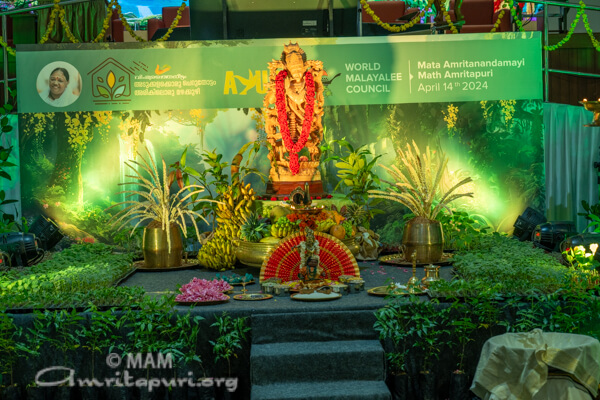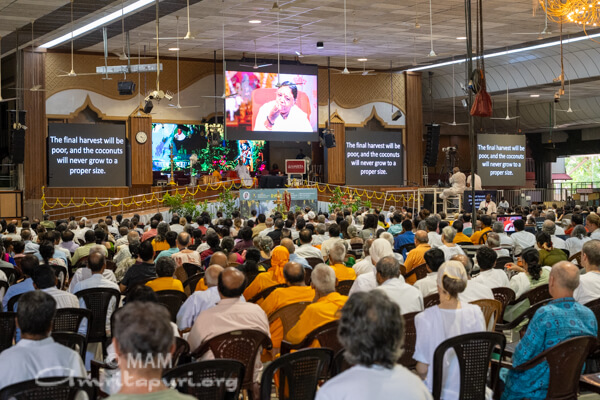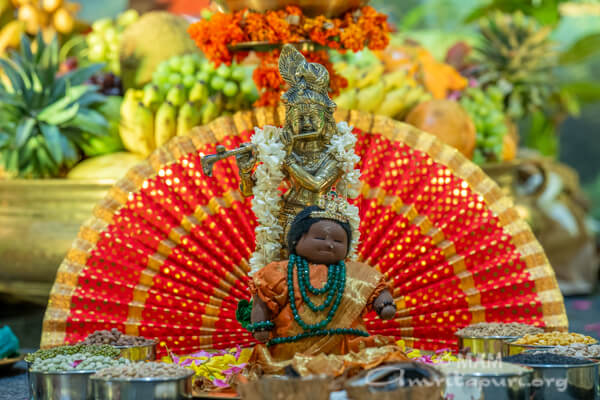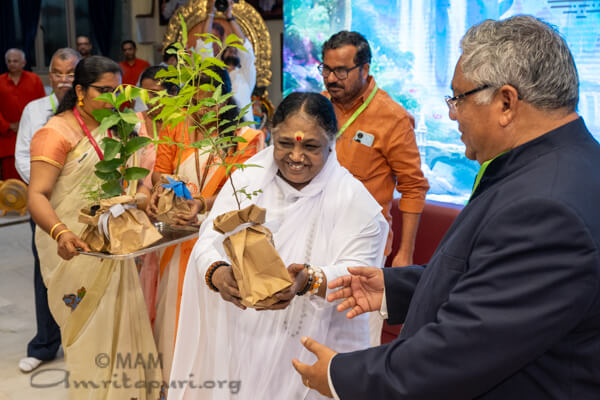14 April 2024, Amritapuri Ashram
In a vibrant and spiritually enriching celebration of Vishu, thousands of devotees gathered at Amritapuri Ashram received Amma’s timely and profound message: “Kitchen Garden to Grow, Rainwater to Hold.” This message underscores the critical need for water conservation and sustainable living practices.
Before stepping onto the dais, Amma paid her respects and offered flowers at the plants arranged as Vishukkani, setting a tone of reverence for the event, which will be distributed to volunteers later.

Amma emphasized the vital role water plays as the foundation of life on Earth, highlighting the paradoxical situation in Kerala, a state blessed with 44 rivers and abundant rainfall yet facing increasing water scarcity. “Water is the very foundation of life on Earth. The entire ecosystem of our world thrives on pure water. Without water, there is no life. Today, not just mankind, but all living beings, face water scarcity,” Amma noted.
Amma called upon everyone to embrace the responsibility of collecting every drop of water that falls on our land, replenishing groundwater reserves, and ensuring a sustainable future for the next generations.
In response to these challenges, AYUDH members and Amma’s children worldwide are engaging in various nature conservation activities to bring Amma’s message into action. The World Malayali Council has also joined these efforts to make our planet greener.
Speaking on the occasion, Amma said: “Viṣu arrives carrying the message of joy, beauty, and prosperity. With the viṣukkaṇi—the ritual of viewing the beauty of Kṛṣṇa and the abundance of Nature first thing in the morning—we joyfully celebrate the advent of a prosperous new year on Viṣu Day.
While Oṇam is a harvest festival, Viṣu is a sowing festival. Mother Earth receives those seeds and yields them back a hundred or thousandfold. In creating that prosperity, humanity’s modest role lies in planting the seeds. Similarly, Viṣu also serves as an invitation to plant the seeds of virtuous culture and moral values in the younger generation. If we put in this effort, God will bless us with a hundred or thousandfold result.
We may sow the seeds on time and work hard to irrigate the soil. If it does not rain, we may say, ‘So what if God did not provide water in the form of rains – we have dug borewells using our intelligence.’ But even for groundwater to be present, we need rain. Without rain, how long can we continue to draw water from the ground?
Say we sow the seeds, water them and the crop grows well and is ripe for harvest. But just a few weeks before the harvest, a huge storm hits. The crop will be destroyed. This is an example of actions being done at the right time and with proper effort, but, yet, failing to attain completion due to lack of God’s grace.

This is why it is said that we are entitled only to proper effort, not to results. We can plant the seeds and water them properly. But for the plants to be healthy and strong, proper sunshine and rain are needed. For a good harvest, the crop needs wind blowing from both sides and alternating rain and sun. For example, for coconut trees, if the tree does not receive enough water, the coconuts will fall as babies. The final harvest will be poor, and the coconuts will never grow to a proper size. Similarly, for coffee plants to flower, a light rain is needed. If it fails to drizzle, the coffee plants will not flower.
What becomes evident here is that we are entitled only to our effort. For them to bear the intended result, we require God’s grace. This is why Amma always emphasizes the role of time, effort, and grace. The sweetness of action comes only with God’s grace. So, do not despair. Do the proper actions at their proper time. Realize, however, that your sole entitlement is in the action and then surrender. This will help you live a peaceful life.

The viṣukkaṇi is ritually glimpsed on Viṣu morning during the brahma-muhūrta—the 48 minutes in the middle of the sarasvatī-yama at the end of the night. Traditionally the household elders view the viṣukkaṇi first. Then, the mothers wake up their children and take them to the kaṇi with their eyes covered. This is done so that the first thing they see in the New Year is God. Besides the yellow kaṇikkoṇṇa flowers and the kaṇi, cucumber, raw rice, coconut, bananas, vegetables, betel leaves and areca nut, ashtagandha (fragrant powder made from the combination of 8 herbs), spiritual books, new clothes, gold ornaments, gold coins, metal mirror, and other items are arranged in a circular brass container called an uruḷi. These indicate not just equality, but also dharma, knowledge, and devotion. The symbolism here is that if we depend on God, we will receive every prosperity, be it material or spiritual. The koṇṇa flowers symbolize innocent devotion. The lamp represents knowledge, and the metal mirror implies the reflection of the bliss of the Self.
We must live in harmony with Nature, honoring the Earth, its mountains, rivers, and all living beings with inclusivity, reverence, and protection. This is the eminent, all-encompassing culture our ancestors bequeathed us. Viṣu is a call to reclaim that great tradition.
Another idea Amma is proposing to the government is to make small ponds or watersheds—each in about 10 cents of land in the forest. By lining the ponds with plastic sheeting, we can ensure the water remains in the ponds. A pipe system can be installed to supply water, and it can also harvest rainwater. Implementing such a system, spaced at intervals, will guarantee sufficient drinking water for wild animals and deter them from entering human settlements in search of food or water.
On this Viṣu Day, may we dedicate ourselves to displaying compassion towards all living beings and restoring the Earth’s beauty adorned with lush plants and trees. May the grace of the divine bless us with the wisdom to discern rightly and to exert the right effort towards this” she said.

Amma’s message reminds us that Vishu as not only a festival of new beginnings but also a call to action for environmental stewardship and sustainable living.
Amma then distributed saplings to the office bearers of the World Malayali Council and AYUDH members, symbolizing a commitment to environmental stewardship.
-Sakshi
see more photos here…















